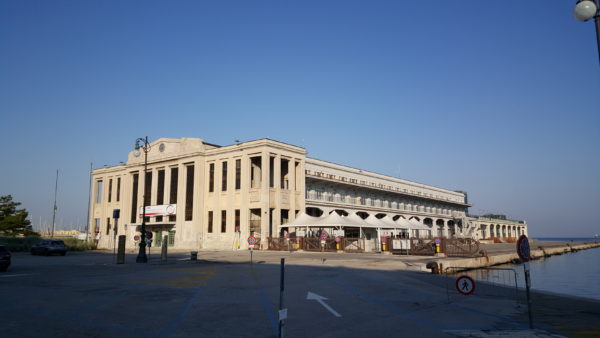
The EMS 2016 Venue
What did I learn from the 2016 annual European Meteorological Society (EMS) conference that last week was hosted in Trieste (Italy)?
I think the biggest news from the conference was that new reanalyses are soon to be released by the European Centre for Medium-ranged Weather Forecasts (ECMWF). One new product known as ERA-5 will replace the older called ERAINT, and preliminary results suggest a significant improvement in addition to higher spatial resolution. Check this webportal for ECMWF’s different reanalysis products. By the way, the naming convention of these reanalyses is rather strange and seems to defy any logic (first there was ERA-15, then ERA-40, followed be ERAINT, ERA-20C,…).
A coupled reanalyses known as CERA-20 was also presented, which breaks with the traditional atmosphere-only products. A coupled assimilation scheme for both atmosphere and ocean seems to give better quality and more consistent results.
Some of the results presented at the conference involved trends in temperature and precipitation statistics, and we are now seeing more intense rainfall. This is not entirely new, but we are getting a clearer picture on intense hourly rainfall. Also, observations suggest more drought in eastern Mediterranean, which is a region affected by both subtropical and mid-latitudinal weather phenomena.
If I were to pick one out of several good candidates, then perhaps the most interesting talk in the synoptic climatology session (for which I was co-convener) was on the ocean’s heat loss to atmosphere connected with surface turbulence. The message was that most of the heat exchange takes place over short time intervals, and that the most extreme magnitudes of heat exchange seem to be associated with high pressure system with cold air outbreak and an interaction with cyclones.
One tradition of the ESM conferences is to award the silver medal, and this year’s EMS Silver medal was given to Michel Jarraud, who, according to my notes, said that he regards meteorology as the leading edge in science and that numerical weather prediction is one of the great success stories. He also observed that weather was significant in the propagation of ebola, and that there is an urgency to act on climate change mitigation and adaptation. Another message was that we should not try to be perfect – it’s too costly and inefficient. Much of our knowledge is good enough for action on climate change. Another concern was about capacity building and that some nations soon may have meteorological services which will run without meteorologists.
Another impression was that climate adaptation seems to be stuck (also see recent post on mid-latitude storms) with limited resources devoted to climate services and little demand for climate information for decision making. There is still a question of added value for people who make the effort to incorporate such information in their business model or in governance (also see the post on added-value).
The conference had several parallel sessions and that spanned over a wide range of themes on applied meteorology and climatology, such as communication, TV meteorology, and forecasting, in addition to common climate research issues (check the conference website). I could not cover all, so I may have missed some of the interesting results.
rasmus @ 18 September 2016
source: http://www.realclimate.org/
original story HERE
Get more of The Global Warming Blog. Bookmark this page and sign up for the blog’s free RSS Feed. Sign up for free Global Warming Blog by clicking here. You will automatically be emailed a regular summary of the latest global warming headlines.
To help do something about the climate change and global warming emergency, click here.
Sign up for our free Global Warming Blog by clicking here. (In your email, you will receive critical news, research, and the warning signs for the next global warming disaster.)
To share this blog post: Go to the Share button to the left below.

Be the first to comment
Sign in with